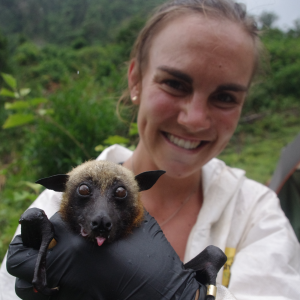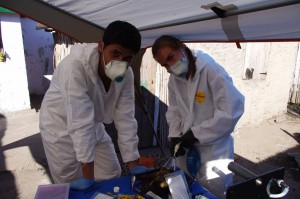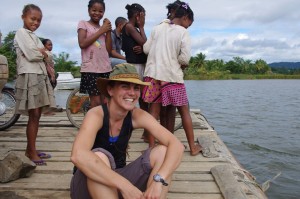“My friends, family, and classmates sometimes ask me why I do the things I do,” muses Ph.D. student Cara Brook in a recent NatGeo blog post. “Why do I spend so much time in remote corners of the world, tracking lethal viruses in enormous bats?”
In its broader form, this is a question all researchers can relate to: not just why she is so passionate, but how she found such passion for her particular research. How can we ever choose one question, of all the world’s exciting unknowns, for a thesis, or Ph.D., or career?

Cara and I met up in a campus coffee shop – each of us, like good ecologists, bringing a reusable mug – and I asked Cara how she came to her research. Over the past four years, Cara has spent more time in Madagascar than in Princeton. In the field, she camps in the remote wilderness, traps fruit bats, and collects samples of their blood, hair, and (sometimes) teeth, to trace the paths of pathogens through populations. Cara has sacrificed much – warm showers, wi-fi, and uninterrupted sleep, to start – for her research. How did she find a question that drives her so deeply?
Cara’s love of natural systems was born in Yosemite: first on family trips, and then through research, studying ravens’ foraging behavior for her Stanford senior thesis. After graduation, an internship with the World Wildlife Fund brought her to Madagascar, where she fell in love with the “Eighth Continent” and the intersection she saw there of humans and nature, development and conservation. She then jumped to Kenya, where she managed a study of disease in rat populations, developing field skills and a passion for disease ecology.
By the time Cara was applying to graduate schools, two years after completing her Stanford degree, she knew she wanted to go back to Madagascar to study disease ecology.

“On some level, I also knew that I was completely fascinated by bat pathogen questions,” Cara adds. She had helped with some bat netting before, briefly, during the first year of her Ph.D., and had grown fascinated with the unique ways bats resist and transmit diseases. Importantly, these diseases can jump from their animal hosts into human populations – as with, for example, Ebola. But Cara hadn’t studied bats before. “Doing that for a Ph.D. seemed overwhelming,” she remembers. “I just wasn’t sure if I was qualified.” Rodents, on the other hand, were familiar from her work in Kenya. Cara set out to study rats.
Cara hadn’t studied bats before. “Doing that for a Ph.D. seemed overwhelming,” she remembers. “I just wasn’t sure if I was qualified.”
Her first year, Cara boarded the plane to Madagascar carrying some traps, a net, and a permit that allowed her to catch pretty much anything. In her blog, she recalls a “secret terror” of the vast unknown ahead. She didn’t speak Malagasy, wasn’t sure where she was going, and had not yet met the local researcher who would be her collaborator for the next three and a half months. When she got to the field, she realized she hadn’t packed for Madagascar’s winter, where nighttime temperatures drop below freezing. She grew more uncertain than ever about the future of her research, fearing, perhaps, that she was as unprepared for her Ph.D. as she was for the highlands’ frigid nights.
Towards the end of the season, however, she located a few fruit bat roosts. She returned to Princeton to pitch a new plan to her adviser. He responded with skepticism, but Cara persisted, and returned to Madagascar the following summer, hoping to catch bats.
On her first day in the field that season, Cara didn’t catch a single bat. She sat in camp that night, looking up at the forest canopy and her bat nets stretched between the trees. “This isn’t going to work, is it?” she remembers thinking. “I’m not going to have a Ph.D.”
“This isn’t going to work, is it?” she remembers thinking. “I’m not going to have a Ph.D.”
Then, the next day, she caught some bats.
And then some more.
By the end of the season, Cara had collected, exported, and assayed samples that would allow her to track viruses’ flow between discrete bat populations and individuals – and to model the risk of diseases spilling over to infect humans. She had the beginnings of a thesis.

Reflecting on Cara’s story, I remember being told that the most important criteria when choosing a research topic is feeling passionate about it. This is simple, beautiful – but how can I ever know what I really want to do with my life? Hearing Cara talk about this process makes it seem infinitely less intimidating. She has found research that drives her, not by divine inspiration, but by experiment: a process of trial and error, in which she is both the researcher and the subject. Cara has gained a better sense of her interests from each of her jobs and research experiences. Her undergraduate thesis, her first trip to Madagascar, and even the grueling research project she worked on in Kenya all helped Cara in the process of defining her research.
It is through this process of self-discovery that we might find, if we are lucky, a life work. And this is a life work in itself: the most personal, rewarding research we will ever do.
– Zoe Sims, Natural Sciences Correspondent

